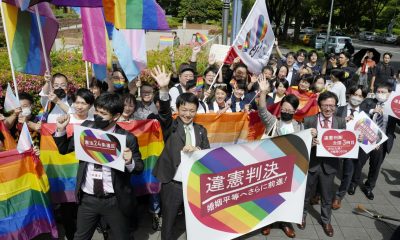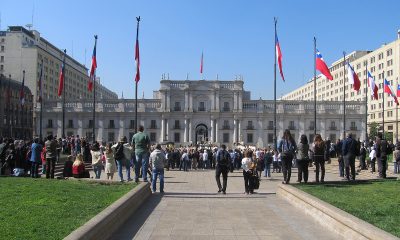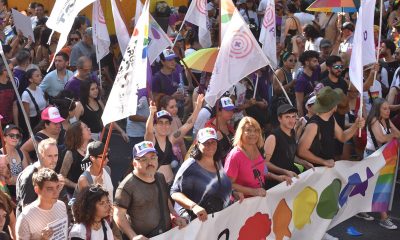South America
Chile president backs marriage equality
Activists are celebrating Sebastián Piñera’s historic change of heart

Editor’s note: The Los Angeles Blade on Thursday published a Spanish version of this story.
SANTIAGO, Chile — Chilean President Sebastián Piñera on Tuesday announced he supports a marriage equality bill, marking a historic change of heart since he had previously opposed two people of the same sex being able to marry.
“I think the time has come for marriage equality in our country,” said Piñera in a surprising declaration that left no doubts.
“We must deepen the value of freedom, including the freedom to love and to form a family with a loved one, and (we must) also expand upon the value of the dignity of all relationships of love and affection between two people,” stressed the president during his last speech to Congress.
Justice Minister Hernán Larraín on Thursday confirmed “great urgency will be placed on it so that it can proceed with some speed and I believe it shouldn’t be very difficult because there are majorities in Congress to approve this measure. The president’s intention is not to introduce a new bill, but to move forward with the one that was already in the Senate.”
The bill that Larraín mentioned is the one that former President Michelle Bachelet sent to Congress in 2017 soon after the country entered into an agreement with the Inter-American Court of Human Rights after the Movement for Homosexual Integration and Liberation (Movilh), the country’s oldest LGBTQ rights organization, filed a lawsuit.
This means each chamber of Congress should dispatch the bill within 15 days, which Movilh President Rolando Jiménez says is a “great and hopeful sign for same-sex couples and same-sex families who live in complete legal inequality.”
“After 30 years of struggle, we are closing one of the most important battles for LGBTIQ people,” he said. “All families will finally have the dignity they deserve.”
Jiménez, who has been fighting for LGBTQ rights in the country for many years, pointed out that “we value this change in attitude by Piñera.”
“We hope that the Congress between today and tomorrow will recognize the utmost urgency (to pass the marriage equality bill.),” said Jiménez. “We especially recognize and highlight that Piñera decided to promote the same bill that we drafted together with former President Michelle Bachelet within the framework of the agreement that the State and Movilh signed before the Inter-American Commission on Human Rights.”
Jiménez added that he and Movilh “declare ourselves especially excited because this announcement is taking place during Pride month and weeks before Movilh celebrates 30 years of struggle on June 28.”
Same-sex couples in Chile since 2015 has been able to enter into civil unions, but LGBTQ activists say this legal status is insufficient. Seven Latin American countries — Argentina, Brazil, Colombia, México, Uruguay, Ecuador and Costa Rica — are among the nations that have extended marriage rights to same-sex couples.
Reactions to Piñera’s announcement
Piñera’s announcement generated a genuine political earthquake. #MarriageEquality immediately became a trending topic on Twitter. Members of Piñera’s party in Congress accused him of “treason” for deciding to push forward with the bill.
The opposition, meanwhile, celebrated the decision, but resentments remain since its relationship with Piñera’s government has been broken for a long time because of its handling of the pandemic, human rights violations during social unrest and other differences.
The Catholic Church, on the other hand, through a statement declared itself in opposition to the measure. “What is established and wanted by God is that it (marriage) is only between a man and a woman,” it said.
“From the point of view of the rights of people who decide to live together, national legislation has established a regime that legally protects their decision and grants it recognition,” the church pointed out, referring to the civil union law that does not allow adoption and does not recognize paternity.
The church also affirmed that “those of us who follow Jesus Christ as Lord and savior and are guided by his teaching hold the truth that marriage established and willed by God is only between a man and a woman, a communion that creates life and establishes the family.”
Wave of anti-LGBTQ violence
Piñera’s announcement coincides with a dramatic increase in violence against queer people in Chile. The judiciary system and the government have not responded to the majority of cases in a timely manner.
Fundación Iguales, a Chilean group allied with the Human Rights Campaign, in partnership with AllOut recently launched a campaign to stop the violence and to urge Piñera’s government to reform the Anti-Discrimination Law passed in 2012 in the wake of the anti-gay attack against Daniel Zamudio, a case that sparked outrage in Chile and around the world.
The goal of the “No More Laws with Name” campaign is to raise awareness about the need to improve the current legislation to ensure that it actually prevents hate crimes.
Fundación Iguales said it based the campaign on a survey to which 1,454 LGBTQ adults from across the country responded. Two-thirds of respondents said they had been verbally attacked over the last five years.
The results also show that a quarter of respondents said they have been physically assaulted at some point in their life because of their sexual orientation, identity or gender expression. Most of these attacks occurred in public.
“Fundación Iguales has a zero-tolerance policy for violence against LGBTI people,” said Fundación Iguales Executive Director Isabel Amor. “For this reason, we have, in addition to preparing our own survey, created an interactive platform that will allow everyone, regardless of their sexual orientation, identity or gender expression, to know about their chances of suffering an attack or hate crime.”
“The numbers make clear the need for urgency to respond to the demands of sexual diversity (activists), to have full inclusion in terms of rights and benefits,” added Amor. “The first thing we have to do to achieve this is to establish that the demands for security and inclusion, as well as for marriage equality, are not niche things, but those for the majority of the population.”

Brazil
US lists transgender Brazilian congresswoman’s gender as ‘male’ on visa
Erika Hilton has represented São Paulo since 2022

A transgender Brazilian congresswoman says the U.S. issued her a visa that listed her gender as “male.”
Erika Hilton on Wednesday wrote on her Instagram page that she requested a visa that would have allowed her to travel to the U.S. in order to participate in the Brazil Conference at Harvard University and the Massachusetts Institute of Technology.
The conference took place earlier this month.
“I was classified as ‘male’ by the U.S. government when I went to get my visa,” wrote Hilton, who added a visa she received from the U.S. in 2023 listed her gender as “female.”
Hilton is a Black travesti and former sex worker from São Paulo who won a seat in the Brazilian Congress in 2022. The Washington Blade spoke with Hilton shortly after her election.
“It is a big responsibility … but I feel very honored,” said Hilton. “I very much like to be able to be a representative for my people, and the more than 250,000 people who voted for me have confidence in me,” she said after she spoke at a rally in support of now Brazilian President Luiz Inácio Lula da Silva in a São Paulo square. “This demonstrates that our work has the potential to have a gigantic reach; where we can advance efforts to end death, poverty, misery, genocide that we have.”
President Donald Trump in his inaugural speech announced the federal government’s “official policy” is “there are only two genders, male and female.” The Trump-Vance administration has also banned the State Department from issuing passports with “X” gender markers.
Germany and Denmark are among the countries that have issued travel advisories for trans and nonbinary people who plan to visit the U.S. These warnings come ahead of WorldPride, which is scheduled to take place in D.C. from May 17-June 8.
Hilton said she is “not surprised” the U.S. issued her a visa with a male gender marker.
“I’m also not surprised by the level of hatred and fixation these people have with trans people,” she said. “After all, the documents I presented are rectified, and I’m registered as a woman, even on my birth certificate.”
Hilton further accused the U.S. of “ignoring official documents from other sovereign nations, even from a diplomatic representative.”
“At the end of the day, I’m a Brazilian citizen, and my rights are guaranteed and my existence is respected by our own constitution, legislation, and jurisprudence,” she said.
Editor’s note: Duda Salabert, another transgender Brazilian congresswoman, also said the U.S. listed her gender as “male” on her American visa.
Argentina
Argentina’s transgender community confronts ‘chaotic, desperate’ situation
President Javier Milei has implemented several anti-trans directives

Editor’s note: Washington Blade International News Editor Michael K. Lavers will be on assignment in Argentina through April 12.
BUENOS AIRES, Argentina — A group of Argentine transgender activists with whom the Blade spoke on April 4 said President Javier Milei’s policies have made their community even more vulnerable to violence, discrimination, and poverty.
“The situation is really chaotic, desperate,” said Florencia Guimares García, a travesti activist who is president of the House of Lohana and Diana Civil Association. “There is also a lot of fear among the trans and travestí community towards the government’s policies.”
Guimares’s group is named after Diana Sacayán, a prominent trans activist who was stabbed to death inside her Buenos Aires apartment in 2015, and Lohana Berkins, the founder of the Association for the Fight for Travesti and Transsexual Identity who died in 2016.
Guimares and three other trans activists — Julia Amore, Sasha Solano, and Daniela Ruiz — spoke with the Blade after they participated in a trans and travestí rights forum that took place at an LGBTQ cultural center in downtown Buenos Aires. Alba Rueda, the country’s former special envoy for LGBTQ rights, also took part.
“We are in a bad moment for the rights and quality of life of LGBTQ+ people,” Rueda told the Blade during a February 2024 interview.

Milei took office on Dec. 10, 2023, after he defeated then-Economy Minister Sergio Massa in the second round of that year’s Argentina’s presidential election. Rueda resigned before Milei assumed the presidency.
Milei, an economist and former congressman, shortly after he took office eliminated the country’s Women, Gender and Diversity Ministry.
Milei last year closed the National Institute Against Discrimination, Xenophobia and Racism, a government agency known by the acronym INADI that provided support and resources to people who suffered discrimination based on sexual orientation, gender identity, and other factors. Milei in 2024 also dismissed trans people who the government hired under the Trans Labor Quota Law, which set aside at least 1 percent of public sector jobs for trans people.
Argentina’s landmark Gender Identity Law that, among other things, allows trans and nonbinary people to legally change their gender without medical intervention, took effect in 2012 when Cristina Fernández de Kirchner was president. Milei on Feb. 5 issued a decree that restricts minors’ access to gender-affirming surgeries and hormone treatments.
Gay Congressman Esteban Paulón, a long-time LGBTQ activist, filed a criminal complaint against Milei after he linked the LGBTQ community to pedophilia and made other homophobic and transphobic comments during a Jan. 23 speech at the World Economic Forum in Davos, Switzerland. Millions of people in Buenos Aires and across Argentina participated in marches against Milei that took place less than two weeks later.

Milei is among the heads of state who attended President Donald Trump’s inauguration. Milei also spoke at this year’s Conservative Political Action Conference in National Harbor, Md.
“Violence is more explicit, more common,” Guimares told the Blade, noting police violence has become more common against sex workers who are trans or travestí since Milei took office. Guimares added this situation is worse outside of Buenos Aires.
“The situation is different, depending on the location, and even more so in other provinces,” she said. “Even living in the province of Buenos Aires isn’t the same as living in Salta, or in Jujuy, or in Corrientes, or in provinces where the population is more conservative, where the discourse from the churches is much stronger, where all of this has a much crueler impact.”
“Milei’s discourse has legitimatized all of this,” added Guimares.
Amore said Argentina before Milei “had been a beacon” for human rights around the world.
“We’ve been building these laws with a lot of struggle, a lot of effort, with allies, and it wasn’t enough because we didn’t reach our goal,” she said. “These are very young. Our democracy is very young; we have a 40-year-old democracy and we are talking about a Gender Identity Law that is 12-years-old.
Amore added Milei is trying to erase trans and travestí people. Ruiz, an activist and actress who founded Siete Colores Diversidad, agreed.
“It is a cultural battle for us,” Ruiz told the Blade, referring for the continued struggle for trans and travestí rights in Argentina.
“It marks a cultural paradigm shift that we were carrying out day after day, making ourselves visible,” she added. “We carried it out by making ourselves politically visible, by presenting our travestí and trans Latin American visibility as a beacon to the world.”
The activists spoke with the Blade less than three months after Trump took office.
The American president, like Milei, has targeted the trans community with executive orders and policy directives. These include banning the State Department from issuing passports with “X” gender markers and prohibiting trans adults and young people from sports teams that correspond with their gender identity.
Solana, a trans woman from Peru who advocates on behalf of migrants, noted one of the first executive orders that Trump signed directed the federal government to only recognize two genders: Male and female.
“Man and woman. Period,” she said.
Guimares added Milei’s anti-LGBTQ discourse isn’t even his “original speech, but rather a line drawn from the U.S. government of Donald Trump and its agenda, which he established from the beginning and which he campaigned on as well.”
“This also follows in line with parties like Vox in Spain and other European countries, where we see how in Hungary, where an LGBTI Pride march (in Budapest) is now banned, and in other countries around the world where the population is having a really hard time,” said Guimares. “So, it’s not something original from Milei, but rather he’s taking part in those political agendas to generate strategies and alliances to be able to access economic resources.”
Amore, for her part, urged her American counterparts to continue the fight.
“Don’t let down your guard,” said Amore. “Organize. Come together. Speak out. Become visible in community. Respect the diversity of voices and put your own voices first and make yourselves more visible.”
Chile
2024 was ‘year of regression’ for LGBTQ+ rights in Chile
Advocacy group blamed rise in ultra-right, government inaction

A report that a Chilean advocacy group released on Tuesday says 2024 was a “year of regression” for LGBTQ+ rights.
The Movement for Homosexual Integration and Liberation (Movilh)’s 23rd Sexual and Gender Diversity Human Rights report notes LGBTQ+ rights for the first time since democracy returned to Chile in 1990 not only stopped advancing, but saw significant rollbacks in the three branches of government.
The Movilh report describes 2024 as “the year of regression,” noting 23.5 percent of human rights violations against LGBTQ+ people over the last two decades occurred last year. A total of 2,847 discrimination complaints were reported in 2024, representing a 78.7 percent increase over the previous year.
The report documents two murders, 44 physical or verbal assaults, two incidents of violence in police stations, 89 reports of abuse in the workplace, and 65 incidents in educational institutions in 2024. The transgender community was particularly affected, with a 462.6 percent increase in discrimination cases compared to 2023.
The Movilh report notes the growing influence of the ultra-right, whose narratives have fostered hate speech, is one of the main factors behind the deterioration of LGBTQ+ rights in Chile. The advocacy group also criticizes authorities who have remained silent in the face of these attacks, even though they say they support the LGBTQ+ community.
The report specifically singles out the Executive Branch.
Movilh specifically highlights the prohibition of public funds for hormone treatments for trans minors and the postponement of these procedures in public hospitals. The government reversed course after intense pressure and judicial appeals.
The report also criticizes the judiciary.
The Oral Criminal Trial Court of San Antonio refused to classify the murder of a trans woman as a femicide, arguing her identity card still reflected the gender assigned to her at birth. The Court of Appeals of Santiago also ordered the removal of a homophobia complaint on social media, setting what NGOs have described as a dangerous freedom of speech precedent.

The report notes Valparaíso, Metropolitana, and Biobío are the three regions with the highest number of discrimination complaints, with 51.3 percent, 25.1 percent, and 5.8 percent respectively. Reported cases increased in 11 of Chile’s 16 regions, with Ñuble leading the way with a 300 percent increase.
Faced with this bleak panorama, advocacy groups have intensified their efforts to denounce the violence and demand LGBTQ+ rights are once again guaranteed. Movilh, along with other organizations, have approached the Inter-American Commission on Human Rights and the U.N. about the situation in Chile.
“We are seeing a reversal of rights that cost decades of struggle,” warns the report. “If the State does not act urgently, we run the risk of discrimination and violence becoming institutionalized.”
Argentina
Millions march against Javier Milei in Argentina
Protests took place after president’s comments at World Economic Forum

Millions of people in Buenos Aires and across Argentina participated in marches against President Javier Milei in response to his controversial comments at the World Economic Forum in Davos, Switzerland.
The Buenos Aires march, led by LGBTQ+, women’s and human rights organizations in Argentina, shaped up to be one of the largest demonstrations against Milei since he became president in December 2023. The mobilization is a direct response to Milei’s disparaging comments about feminism, LGBTQ+ rights, and other progressive movements.
Milei called “wokism” and “gender ideology” harmful during his Jan. 23 speech at the World Economic Forum, even comparing them to pedophilia. These statements sparked outrage across Argentina with protesters demanding the defense of human rights and equality.
María Rachid, president of the Argentine LGBT+ Federation, told the Los Angeles Blade on Sunday “the march was massive, a strong message to President Milei putting a limit to hatred, discrimination and violence.”
“Argentine society built the values of respect for diversity, equality, and true freedom and yesterday it came out to defend them with massive demonstrations throughout the country and in many cities around the world,” said Rachid. “We are proud of what we were able to build because although they want to destroy it, it is already part of the heart of Argentine society.”
The Buenos Aires march began at the National Congress and ended at the Casa Rosada, the seat of the country’s presidency. Thousands of demonstrators, many with rainbow flags and banners that read “rights are not negotiable,” expressed their strong rejection of Milei’s policies.
Gay Congressman Esteban Paulón highlighted to the Blade “the call for the march was impressive.”
“I think it exceeded any forecast, not only because of the massiveness in the City of Buenos Aires, where it is estimated more than a million people, but also because of the massiveness in the 150 cities in which it was held throughout the country,” he said. “The truth is that it was a very, very big march in Rosario, in Córdoba, in Santa Fe, in Mar del Plata, in Bariloche, in the north, in Salta.”
“There was no expectation that it would be so, so massive, beyond the one in Buenos Aires, which had had an important call, an important visibility, which had added several actors,” added Paulón.

Sofía Díaz, a transgender woman who worked as a civil servant before Milei’s administration fired her, marched in Corrientes, a city in Chaco province.
“After President Milei’s speeches in Davos, the next day we started texting each other on WhatsApp,” she said, referring to public employees at the national level. “We were really afraid of what he had said.”
Activists around the world expressed solidarity with their Argentine counterparts.
Marches took place in cities around the world — including in Santiago, Chile; Montevideo, Uruguay; Rio de Janeiro; São Paulo; Mexico City; London; Madrid; Amsterdam; Berlin; Geneva; Paris; New York; Lisbon, Portugal; and the Spanish cities of Barcelona and Granada.
The Movement for Homosexual Integration and Liberation, a Chilean LGBTQ+ rights group, on Feb. 1 organized a march to the Argentine Embassy. Activists delivered a letter that expressed solidarity with the LGBTQ+ community and repudiated Milei’s policies against it.
Argentina
Gay Argentine congressman files criminal complaint against Javier Milei
President made anti-LGBTQ+ comments during World Economic Forum speech

Argentine President Javier Milei is facing a new controversy after he made a series of homophobic and transphobic comments at the World Economic Forum in Davos, Switzerland.
Congressman Esteban Paulón, a long-time LGBTQ+ rights activist, in a criminal complaint he filed argues the president used discourse that promotes negative stereotypes, and encourages violence against the LGBTQ+ community.
Milei in his Jan. 23 speech made statements that linked the LGBTQ+ community to pedophilia, specifically citing the case of a gay couple in Georgia sentenced to life in prison last year after they pleaded guilty to sexually abusing their two adopted children. Milei also claimed 5-year-old children undergo gender-affirming surgeries, an argument that experts have categorically denied.
These statements sparked national and international outrage.
“Milei radicalizes hate speech based on lies and fabricated truths,” said Paulón in an exclusive interview with the Los Angeles Blade. “He raises harmful stereotypes against the LGBTQ+ community, which generates fear and anguish in our communities. We have filed a criminal complaint, understanding that his statements constitute several crimes aggravated by his presidential investiture.”
Paulón also highlighted the societal impact of Milei’s words, noting many LGBTQ+ families live in fear of having their rights revoked.
“There are fathers and mothers afraid of being denounced for allowing their children to express their gender identity. LGBTQ+ couples fear that their children will be taken away from them,” said Paulón. “This type of discourse activates ultra-conservative groups that politically support Milei, but do not reflect the feelings of the majority of Argentine society.”
LGBTQ+ activists and human rights groups in Argentina have organized a march in Buenos Aires, the country’s capital, that is scheduled to take place on Feb. 1. The event’s slogan, “for a country without hate,” seeks to highlight their rejection of Milei’s statements and a reaffirmation of their commitment to defend LGBTQ+ rights.
Milei, for his part, denied the accusations in a recent interview, pointing out they are part of a campaign that so-called elites have orchestrated.
“I never compared homosexuals with pedophiles, but certain sectors mount these campaigns to generate indignation,” he said.
Paulón stressed his complaint also seeks to have a broader impact on Argentine society.
“Beyond the judicial outcome, we want to open a space for reflection on the importance of not validating hate speech,” he said. “These attacks not only affect a community, but also damage social cohesion and mutual respect.”
Milei has rolled back several LGBTQ+ rights initiatives since he took office in December 2023.
One of his administration’s first acts was to close the Women, Gender and Diversity Ministry and the National Institute Against Discrimination, Xenophobia and Racism, which was known by the acronym INADI. Milei has also dismissed transgender people from public sector jobs.
Argentina
Javier Milei rolls back LGBTQ+ rights in Argentina during first year in office
Gay congressman, activists lead resistance against president

Javier Milei’s rise to power marked a sea change in Argentine politics that profoundly impacted the country’s LGBTQ+ community.
His first year in office has seen a combination of hostile rhetoric and concrete measures that have dismantled historic advances in human rights.
“Javier Milei’s administration is fighting a two-way battle,” Congressman Esteban Paulón, a long-time LGBTQ+ activist, pointed out to the Washington Blade. “On the one hand, symbolically, with an openly homo, lesbo and transodiant discourse, and on the other, in concrete facts, such as the closure of the Ministry of Women, Gender and Diversity, and INADI (the National Institute Against Discrimination, Xenophobia and Racism).”
The decision to eliminate these key institutions sent a clear message: Diversity policies are no longer a state priority. This dismantling left LGBTQ+ Argentines without national advocacy tools.
Some provinces have tried to fill this void, but many others have followed the national government’s lead. This trend, according to Paulón and other activists, has left LGBTQ+ Argentines even more vulnerable.
“What we are seeing is not only a setback in public policies, but also a direct attack on the dignity of thousands of people who, until recently, felt the support of the state,” said Paulón.
One of Milei administration’s first acts was to close the Women, Gender and Diversity Ministry and INADI. These decisions, which Milei said was necessary to reduce “unnecessary public spending,” eliminated agencies that played an essential role in the promotion of human rights and the fight against discrimination.
“Without these institutions, the LGBTQ community has been left unprotected against violence and prejudice. Now, discrimination cases that used to be handled by INADI end up shelved or without follow-up,” Paulón warned. “The message this sends is that our lives don’t matter to this government.”
Paulón and other activists say one of the Milei government’s most alarming decisions is to allow employers to fire employees without legal consequences.
“Today, a person can be fired because of their sexual orientation or gender identity, without the possibility of recovering their job,” warned Paulón.
The new policy has left many employees — especially transgender people — without legal recourse. Advocacy groups say companies have taken advantage of this regulation to carry out selective firings. The freezing of a trans-specific labor quota has deepened employment discrepancies for one of the country’s most vulnerable communities.
Paulón told the Blade that anti-LGBTQ+ rhetoric from Milei and several of his ministers has also had an effect on Argentine society.
“Today, anyone feels they can say anything without consequences,” said Paulón, who noted that ultraconservative and religious sectors view Milei’s government as an ally.
This rhetoric, according to Paulón, has yet to translate into widespread violence.
“We are not yet in a situation of systematic violence as in other countries, but the risk is there,” he said. “Every word of hate from power legitimizes violent actions.”
Congress, civil society leads resistance
In the face of this adverse scenario, resistance has taken various forms.
Paulón and other opposition lawmakers have worked on bills to protect LGBTQ+ rights and reverse regressive measures.
“We will not stand idly by. We put forward concrete proposals to guarantee access to health care, inclusive education and labor protections,” said Paulón.
Activists have strengthened alliances with their counterparts in neighboring countries, such as Brazil and Chile, and Mexico. They are also working with international organizations that have expressed concern about the situation in Argentina.
Although the outlook is bleak, Paulón said he remains hopeful.
“Milei is going to pass, like all processes in democracy,” he said.
Paulón stressed that marriage equality and the transgender rights law are deeply rooted in Argentine society, and act as barriers to stop further setbacks. The challenge now, he says, is to maintain resistance, organize the community, and strengthen international ties.
“We have an organized movement, tools to defend ourselves and a mostly plural and diverse society. This process will also come to an end,” said Paulón. “In this context, the struggle for LGBTQ rights in Argentina is a reminder that social conquests are never definitive and that resistance is vital to preserve the achievements made.”
Colombia
Claudia López mum on whether she will run for president of Colombia
LGBTQ+ Victory Institute honored former Bogotá mayor in D.C.

Former Bogotá Mayor Claudia López did not specifically discuss the growing speculation over whether she will run for president of Colombia in 2026 when she spoke at Saturday’s LGBTQ+ Victory Institute’s Annual International LGBTQ Leaders Conference in D.C., or with the Washington Blade.
“In a week I am going to return to Colombia and I’m coming back with a very, very punctual task,” she said in a speech she gave after the Victory Institute inducted her into its LGBTQ+ Political Hall of Fame at the JW Marriott. “Democracy in the world in general needs emotional reconnection.”
López, 54, was a student protest movement leader, journalist, and political scientist before she entered politics.
She returned to Colombia in 2013 after she earned her Ph.D in political science at Columbia University.
In her speech, López said Juan Francisco “Kiko” Gomez, a former governor of La Guajíra Department in northern Colombia, threatened to assassinate her because she wrote about his ties to criminal gangs. A Bogotá judge in 2017 convicted Gómez of ordering members of a paramilitary group to kill former Barrancas Mayor Yandra Brito, her husband and bodyguard, sentencing him to 55 years in prison.
López in 2014 returned to Colombia and ran for the country’s Senate as a member of the center-left Green Alliance party after she recovered from breast cancer. López won after a 10-week campaign that cost $80,000.
“I was the only woman, the only LGBTQ member of my caucus,” she said in her speech. “Of course I had the honor, but also the responsibility to represent them particularly well, [and] of course all the citizens who trust me and all the citizens of Colombia.”
“Once you are elected, you are elected to represent equally and faithfully all of the people, not only your own people,” added López.
In 2018, López was her party’s candidate to succeed then-President Juan Manuel Santos when he left office. López in 2019 became the first woman and first lesbian elected mayor of Bogotá, the Colombian capital and the country’s largest city.
“This of course speaks incredibly well of my city,” she said in her speech.
López took office on Jan. 1, 2020, less than a month after she married her wife, Colombian Sen. Angélica Lozano. (López was not out when she was elected to the Senate.) Lozano was with López at the Victory Institute conference.
López’s term ended on Dec. 31, 2023. She will return to Colombia once her Advanced Leadership Fellowship at Harvard University ends this month.
“I ended my mayorship,” López told the Blade. “It has been, of course, the honor of my life to be the first female mayor of my city. It was an absolutely beautiful job, but very challenging.”
“I needed a year of rest, of relaxation, and I was fortunate to receive a Harvard scholarship this year,” she added.
López during the interview called for an end to polarization and reiterated her support for democracy.
“We need to listen to each other again, we need to have a coffee with each other again, we need to touch each other’s skin,” she said.
López said parties, candidates, and their political coalitions in Colombia and around the world need to “listen, reconnect, and organize with people” at the grassroots level. López also told the Blade there is a “global crisis of democracy.”
“Each country has its own contexts and challenges, but it seems to me that there is a common element there,” she said.
“So, I return to Colombia rested, grateful after a year of reflection, with proposals in mind, but determined to dedicate time to what I consider the most important work for democracy at this time, which is to reconnect from the grassroots,” added López.
‘I know what love and education can do for any person’
López took office less than three months before the COVID-19 pandemic began.
“We were full of hope, ready to go to offer a new social and environmental contract for Bogotá society for the 21st century,” she said. “But a couple of (months) after being sworn into office, the pandemic of COVID-19 came.”
Unemployment and poverty rates soared in Bogotá during the pandemic, and the city’s residents had less access to health care and other basic services.
López noted her administration in response to the pandemic offered scholarships to young people, supported businesses, and increased funding of the city’s social services. López also said her administration implemented Latin America’s first city-based care system for female care givers, and build three more LGBTQ+ community centers in poor and working-class neighborhoods.
“I know what love and education can do for any person,” she said.
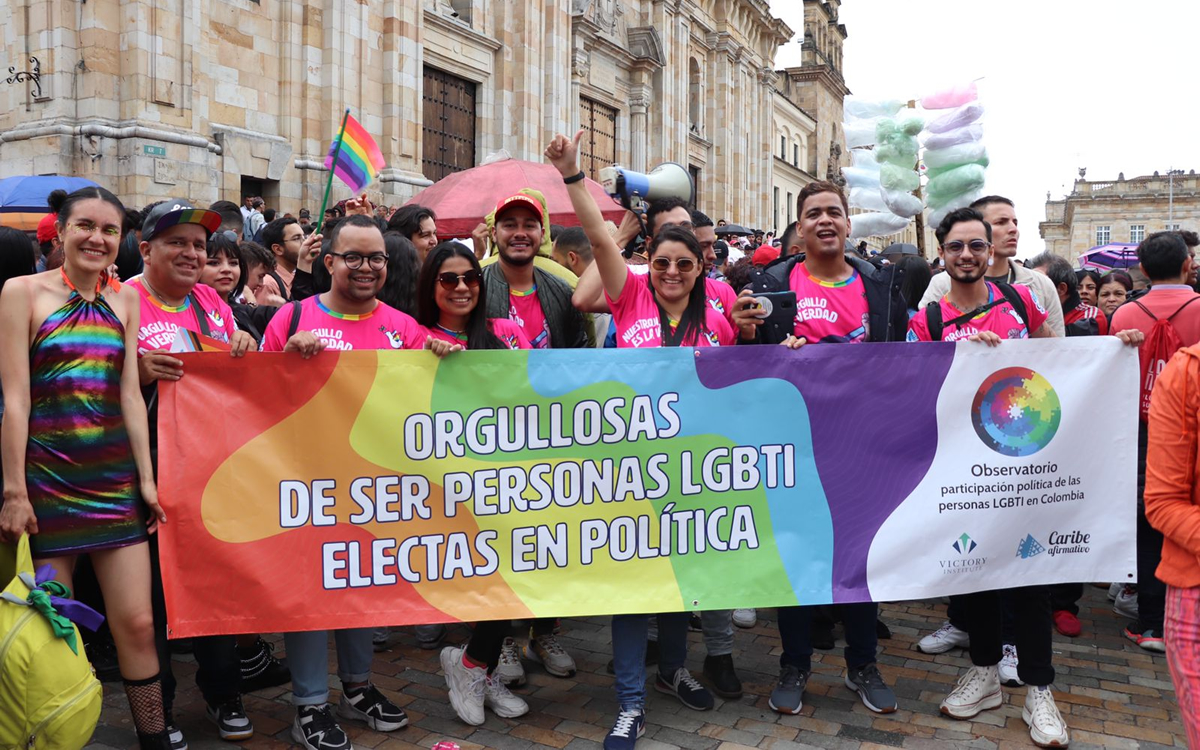
The U.N. Refugee Agency says upwards of three million Venezuelans are now in Colombia.
Then-Colombian President Iván Duque in February 2021 announced Venezuelan migrants who register with the country’s government will be legally recognized.
Former Bogotá Mayor Gustavo Petro, a former senator who was once a member of the M-19 guerrilla movement that disbanded in the 1990s, succeeded Duque as president on Aug. 7, 2022. Colombia and Venezuela restored diplomatic ties less than a month later.
Venezuela’s National Electoral Council on July 28 declared President Nicolás Maduro the winner of the country’s disputed presidential election. Tamara Adrián, the country’s first transgender congresswoman who ran in the presidential primary earlier this year, are among those who denounced voting irregularities.
WPLG, a South Florida television station on March 16, 2021, reported López sparked controversy after she told reporters there have been “some very violent acts from Venezuelans.”
“First they murder, and then they steal,” she said. “We need guarantees for Colombians.”
López made the comments after a Venezuelan migrant murdered a Colombian police officer in Bogotá.
“The problem is not migration from Venezuela,” López told the Blade in response to a question about Venezuela. “The problem is authoritarianism in Venezuela and you have to keep the focus on it.”
“The problem is what it is: It is not the migrants, it is in Maduro, it is in the dictatorship, it is in authoritarianism.”
More than 200,000 people died in the war between the Colombian government and the Revolutionary Armed Forces of Colombia that began in 1962.
Santos and the Revolutionary Armed Forces of Colombia Commander Rodrigo “Timochenko” Londoño on Sept 26, 2016, signed an LGBTQ-inclusive peace agreement. Colombian voters a few days later narrowly rejected it a referendum that took place against the backdrop of anti-LGBTQ+ rhetoric from religious and conservative groups.
Santos and Londoño less than two months later signed a second peace agreement, which also contains LGBTQ+-specific references.
López described herself as “a person totally committed to the peace process.” She added, however, she has “a bit of a bad taste in my mouth now that I look back.”
“The peace process with the FARC, which was to demobilize the FARC, period, certainly tried to have and had a gender focus, of course a diversity focus, a focus on human rights for all victims, and certainly (the) many LGBT victims who had been victims of FARC recruitment, abuse, stigmatization, etc.,” López told the Blade. “So, in some sense, or in many senses, having that gender and diversity perspective was a way of recognizing the victims of our community.”
She noted opponents lied about the LGBTQ+-specific provisions “to deceive and delegitimize the peace agreement.”
“It is not about making anything invisible, or even downplaying anything, but rather about being much more strategic in understanding that we do not want our flags and causes to be exposed in a way that ends up being a boomerang for our own community,” López added. “So, I say that is why it is a disappointment, because I think it is a lesson. At least for me, it made me think and it makes me think, and I have said it openly since then, that we have to be much more careful and much more, above all, strategic, in how we raise our flags so that they really do not only have symbolic, but real advances and so that in no case do they become a boomerang against ourselves.”
‘I know how you feel’
López during the interview praised the recent elections of Mexican President Claudia Sheinbaum, Uruguayan Vice President Beatriz Argimón, and other women in Latin America. She also expressed sympathy with LGBTQ+ Americans who are concerned about the incoming Trump-Vance administration.
“I know how you feel,” said López in her speech. “I’ve been there when we lost the peace referendum in 2016. I’ve been there when three candidates who represented independent, new alternatives in Colombia, and policies were killed by mafia groups in 1990. I’ve been there when a mafia cartel was able to fund and elect a president for all of us. I’ve been there when paramilitary groups were able to support and elect another president in Colombia.”
“I know how obscure and difficult and challenging and painful democratic times are, but we cannot (back) democracy only when we win,” she added. “It’s precisely when things are challenging, when we suffer defeats that are painful, that we need to attach to our democratic and humanistic values and principles.”
Chile
New face of Chilean politics includes LGBTQ+ rights agenda
Municipal and regional elections took place on Oct. 27
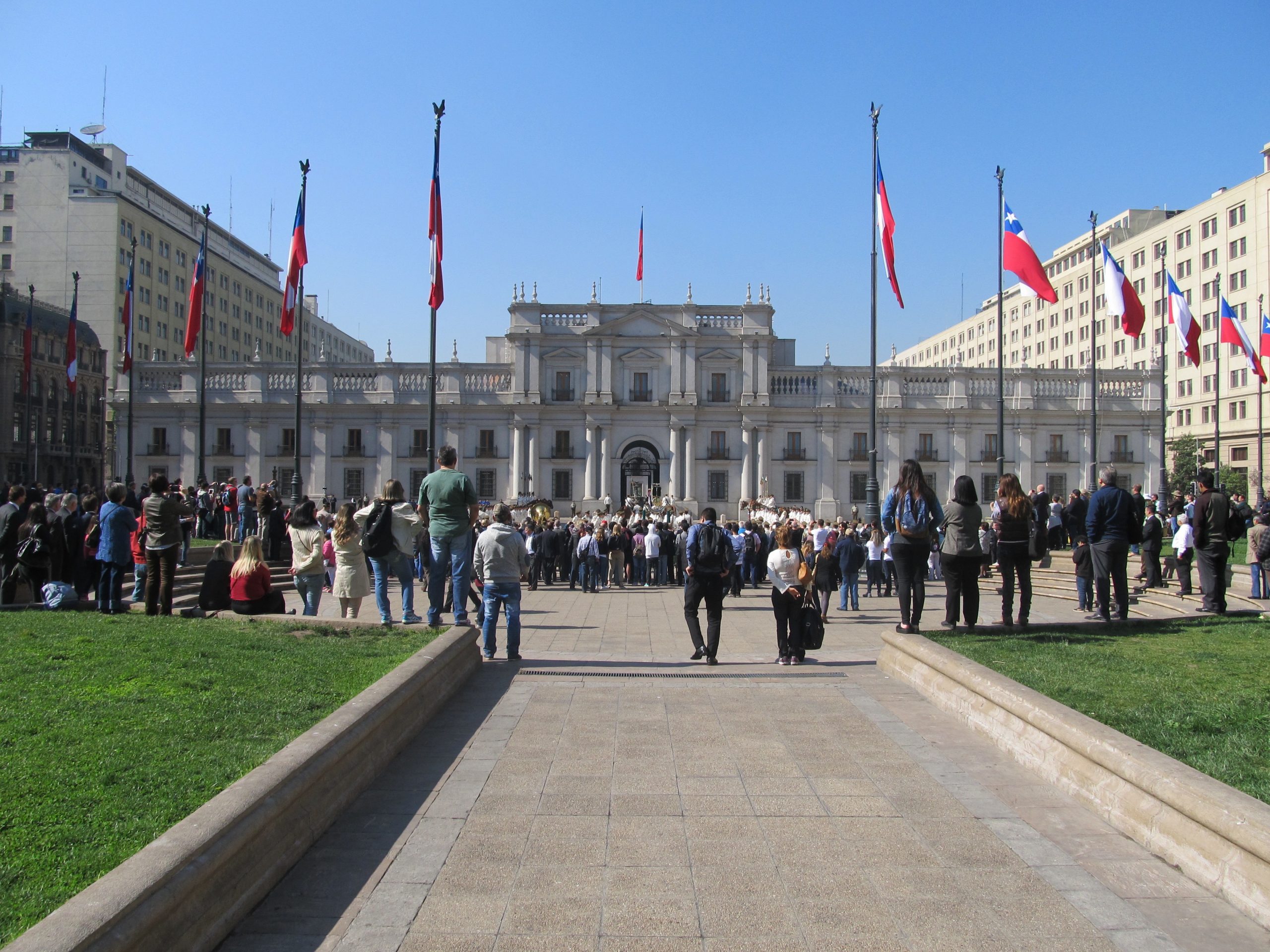
Chile’s municipal and regional elections that took place on Oct. 27 have brought with them a renewed focus on LGBTQ+ rights and diversity.
In a context where the center right has managed to stand out against the Republicans, political parties have incorporated into their platforms a commitment towards the inclusion of queer people. Some Chilean political scientists say the elections have shown a country inclined to vote for the opposition Chile Vamos coalition, even though the left governs Chile.
The ruling party, grouped in Contigo Chile Mejor, had a setback similar to what happened in the 2021 municipal and regional elections — it lost 39 communes that include Santiago, San Miguel, Ñuñoa, and Independencia.
Voters in Maipú, the country’s second most populous commune, re-elected Tomás Vodanovic from President Gabriel Boric’s Frente Amplio.
Frente Amplio also won in Viña del Mar, and other communes, and saw victory in others that include Valparaíso, where the Chilean Congress is located.
Openly LGBTQ+ candidates have emerged since 2012, and some of them have made history. These include Congresswoman Emilia Schneider, a Frente Amplio member who is transgender.
Several LGBTQ+ candidates have resonated with voters within the framework of these elections; not only highlighting their identity, but their commitment to the struggle for equal social rights.
Gloria Hutt, president of Evolución Política (Evópoli), a party that is part of the Chile Vamos coalition, stressed the importance of diversity in its agenda.
“Part of Evópoli’s agenda is inclusion and diversity, including the diversity of communities of different sexual identities. And in this election we had a dozen candidates who belong to sexual diversities, some of them won, others did not, but it is part of the agenda with which we are permanently working,” Hutt told the Washington Blade.
“We believe that it is also part of the freedom of people to deploy their life project without anything else interfering but their own identity and without prejudice preventing them from deploying that identity,” she added.
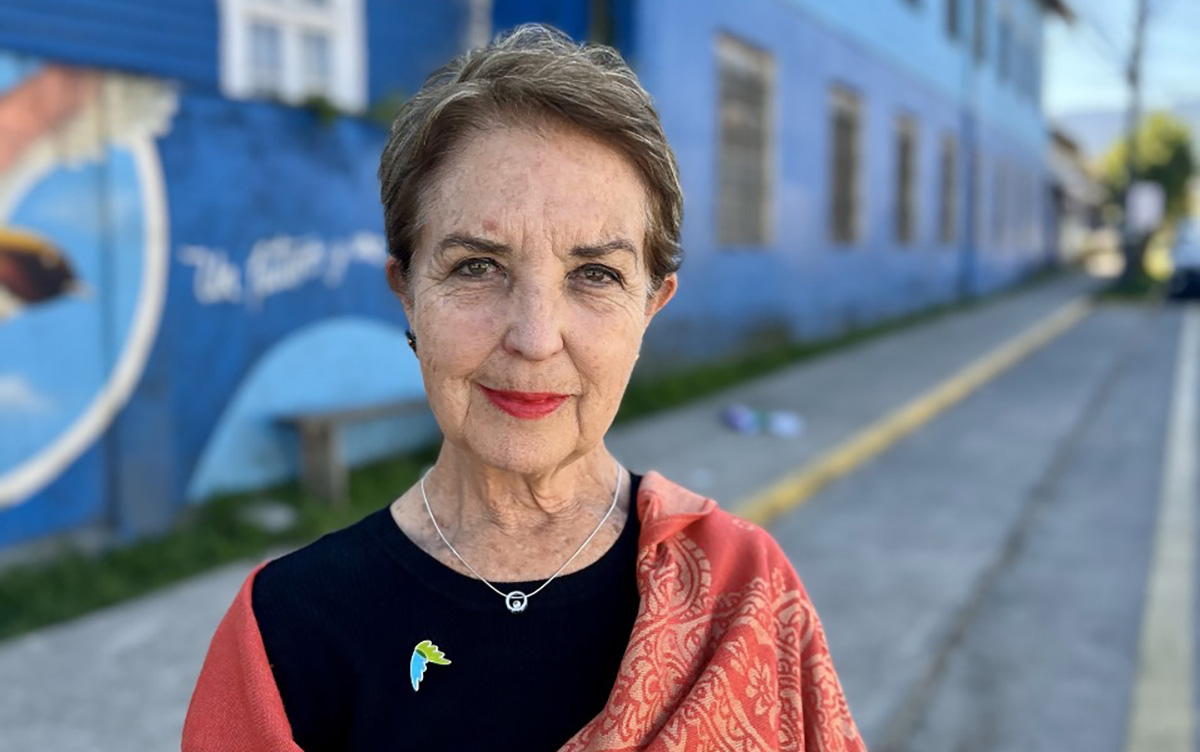
The reelection of figures, such as Viña del Mar Mayor Macarena Ripamonti, and Vodanovic’s success in Maipú reflect significant support for the progressive agenda.
“First of all I would like to emphasize that we saw an impeccable process where citizens were able to express their preferences,” Frente Amplio Secretary-General Andrés Couble told the Blade. “We believe that the results allow us to look to the future with optimism.”
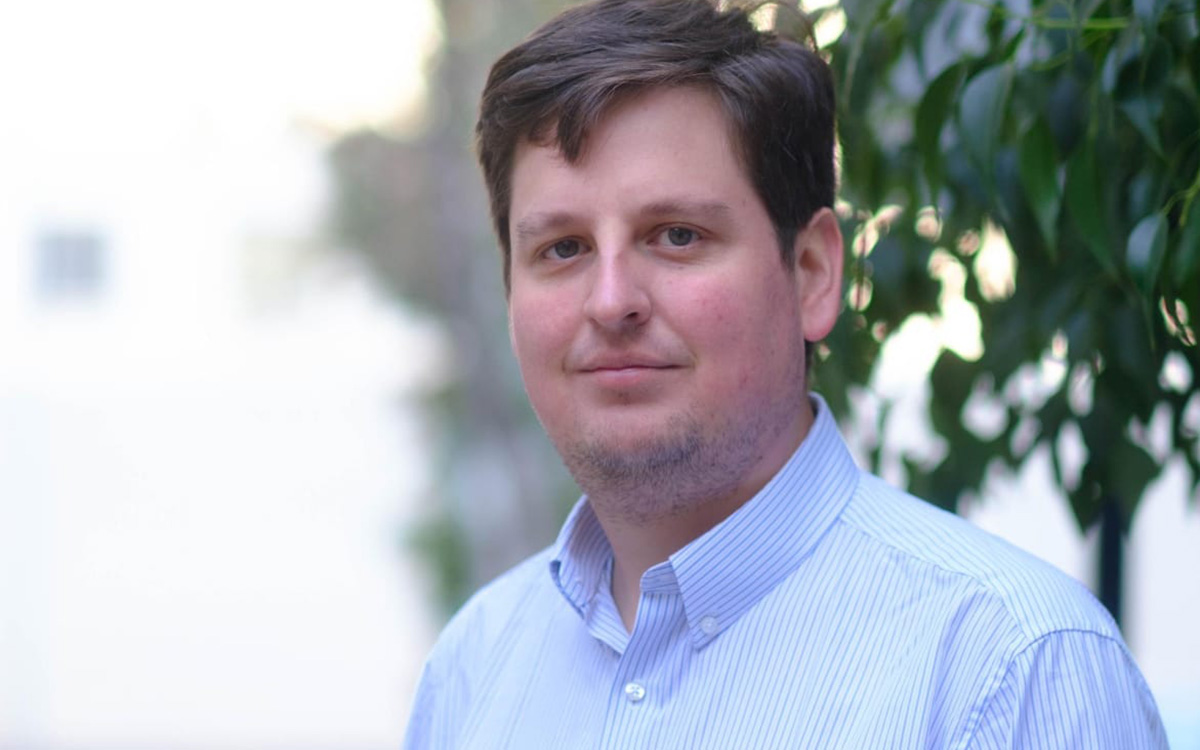
Couble highlighted the importance of LGBTQ+ candidacies in decision-making spaces.
“We think it is important to promote them and that they reach elected positions, because they allow us to bring the struggles for equal rights and respect and promotion of diversity to institutional spaces,” he said.
Couble at the same time highlighted the victory of Bladymir Muñoz, the Chilean councilman who received the most votes, as an example of the advance towards a more inclusive representation.
Muñoz is a Frente Amplio member. He received 41,669 votes in Maipú.
Peru
Victory Institute to honor Peruvian congresswoman at D.C. conference
Susel Paredes is first lesbian woman elected to country’s Congress
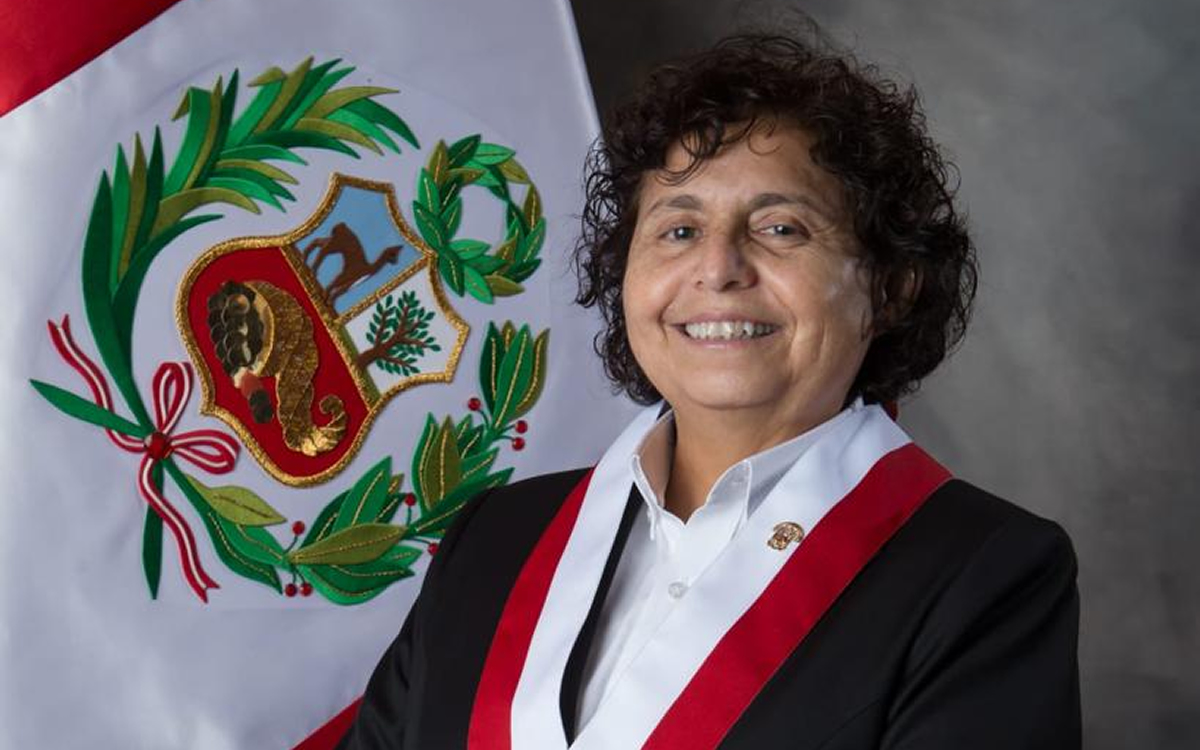
The LGBTQ+ Victory Institute will honor Peruvian Congresswoman Susel Paredes at its annual International LGBTQ+ Leaders Conference that will take place in D.C. in December.
Paredes, a long-time activist who in 2021 became the first lesbian woman elected to the South American country’s Congress, will receive the 2024 LGBTQ+ Victory Institute Global Trailblazer Award.
Paredes and her wife, Gracia Aljovín, married in Miami in 2016. The two women sued the Peruvian government after the country’s Constitutional Court denied their request to register their marriage.
“It is a true honor and a recognition that I deeply value,” said Paredes in a post to her X account after she learned the Victory Institute will honor her in D.C.
Victory Institute Executive Director Elliot Imse described Paredes as “a true champion through her activism and political engagement for decades.”
“Her historic election to the Congress of Peru is just one of many testaments to her status as a true trailblazer who is exceptionally deserving of this honor,” added Imse.
South America
Argentine government closes anti-discrimination agency
LGBTQ activists have sharply criticized President Javier Milei’s decision

Argentine President Javier Milei’s government has officially closed the National Institute Against Discrimination, Xenophobia and Racism (INADI).
INADI, created in 1995, was a key player in the promotion and protection of human rights in Argentina, offering support and resources to people affected by discrimination based on gender identity, sexual orientation, race, and other characteristics.
Officials announced INADI’s closure on Tuesday during a press conference. Milei’s government has presented the move as part of a reform to streamline public administration and restructure human rights policies.
“One of President Milei’s ideals is the reduction of the state and the elimination of everything that does not generate a benefit for Argentines,” presidential spokesman Manuel Adorni said in February when he announced INADI’s closure. “The decision was made to move forward in the dismantling of different institutes that effectively serve absolutely no purpose or are big boxes of politics or places to generate militant employment and the first of them is going to be INADI.”
The international community, including human rights organizations and LGBTQ activist groups, have expressed strong concern.
INADI has played a crucial role in the implementation of progressive laws in Argentina, such as the Gender Identity Law and marriage equality. Its dissolution raises questions about the continuity of these efforts.
“It is extremely serious, especially because we are in a moment in Argentina, not only because of the local context, but also the global context of a growth, an increase in anti-Semitism, racism, violence, xenophobia, LGBTphobia,” gay Congressman Esteban Paulón told the Washington Blade.
Paulón added Tuesday marked “three months since a triple femicide that occurred in the city of Buenos Aires with three lesbian women who were set on fire by a person who attacked them.”
“INADI was acting in many cases as an auxiliary of justice, with opinions that although they were not binding, they were a great support for the judicial instances,” he said.
Alba Rueda is a transgender woman who was Argentina’s Special Representative on Sexual Orientation and Gender Identity under former President Alberto Fernández’s government. Rueda resigned last November ahead of Milei’s inauguration.
Milei’s government earlier this year closed the Women, Gender and Diversity Ministry, under which Rueda worked.
“The closure of Women, Gender and Diversity Ministry, the closure of the special representation on sexual orientation and gender identity, the position of the Foreign Ministry’s position in the OAS (Organization of American States) to reaffirm conversion therapies, and INADI’s closure is one of the situations that comes to institutionally break public policies that protect the most excluded sectors of Argentina,” Rueda told the Blade.
“The closing of INADI is a very, very serious situation,” she added.
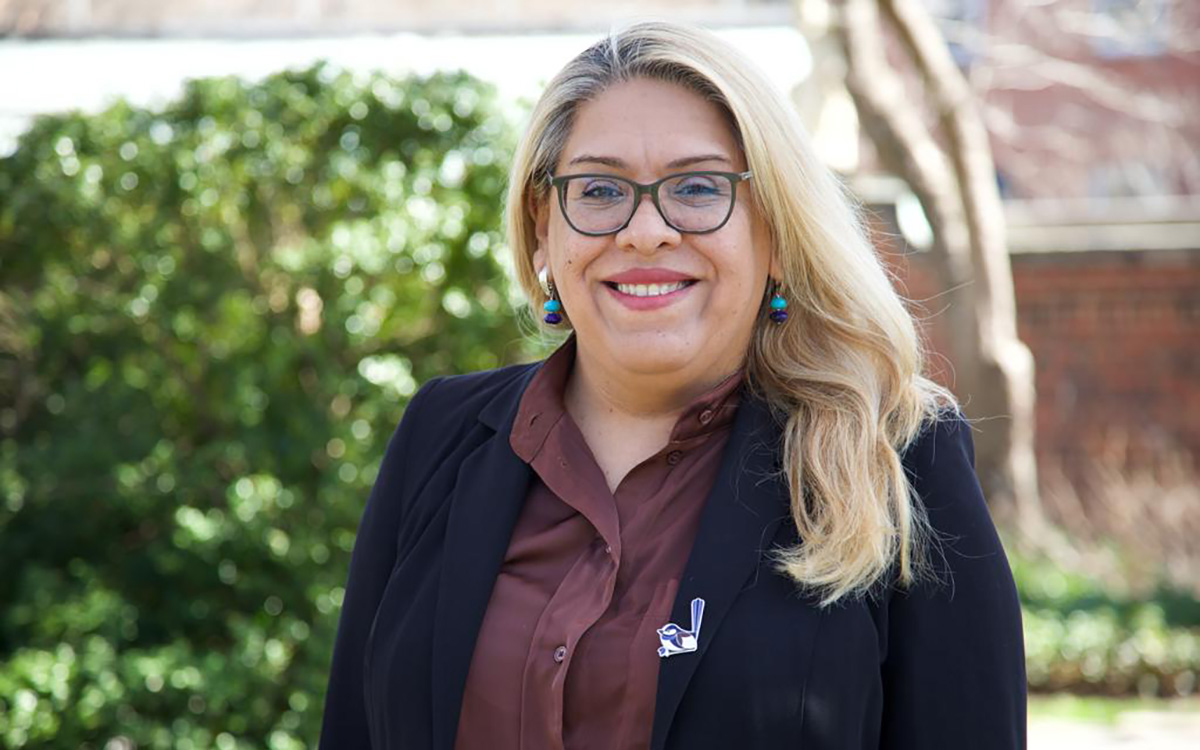
Activists are calling on the government to clarify how it will guarantee queer rights in the future and whether it will create alternative mechanisms to address discrimination complaints.
Santiaga D’Ambrosio, an LGBTQ activist who is a member of the country’s Socialist Workers’ Party, told the Blade “the closure of INADI is an adjustment that endorses discrimination, not only towards sexual diversity, but also towards so many other oppressed, violated or persecuted sectors, such as workers in struggle, migrants, people with disabilities.”
“INADI, in fact, has played a progressive role in the face of discrimination due to political and union persecution in different workers’ conflicts, against dismissals and for the recognition of union privileges in workplaces,” added D’Ambrosio.
D’Ambrosio, at the same time, said INADI’s closure deepens the economic and social crisis through which the Latin American country is going.
“Behind the closure of an agency, there are layoffs and uncertainty among its workers and their families,” said D’Ambrosio, noting layoffs have also taken place at Aerolíneas Argentinas, the country’s national airlines, and other companies. “Meanwhile, the enormous tax benefits for national and foreign businessmen remain untouched.”
D’Ambrosio added LGBTQ Argentines and other marginalized groups have to “self-organize independently from all governments who don’t really care about our lives.”
“We have to debate in our workplaces and study … how to conquer and strengthen our claims in the streets,” said D’Ambrosio.
-

 Arts & Entertainment5 days ago
Arts & Entertainment5 days agoA Night of legacy, love, and liberation: Inside the 2025 April Fool’s Ball
-

 Movies4 days ago
Movies4 days agoHeartfelt ‘Wedding Banquet’ remake a romcom worth seeing
-

 Brazil4 days ago
Brazil4 days agoUS lists transgender Brazilian congresswoman’s gender as ‘male’ on visa
-

 Arts & Entertainment5 days ago
Arts & Entertainment5 days agoSouth Coast Repertory Theatre hosting world premiere production
-

 opinions3 days ago
opinions3 days agoOver 36,000 Angelenos unite for ‘Fighting the Oligarchy’ rally
-

 Books2 days ago
Books2 days ago‘Pronoun Trouble’ reminds us that punctuation matters
-

 Theater3 days ago
Theater3 days ago‘The Broadway Cage Match’ ready to rumble at WeHo’s Musical Mondays
-

 Congress3 days ago
Congress3 days agoEXCLUSIVE: Garcia demands answers on deportation of gay Venezuelan asylum seeker
-

 Features3 days ago
Features3 days agoNew mayor Chelsea Byers, hopes to make WeHo a model city for others to follow
-

 The Vatican4 hours ago
The Vatican4 hours agoPope Francis dies at 88
